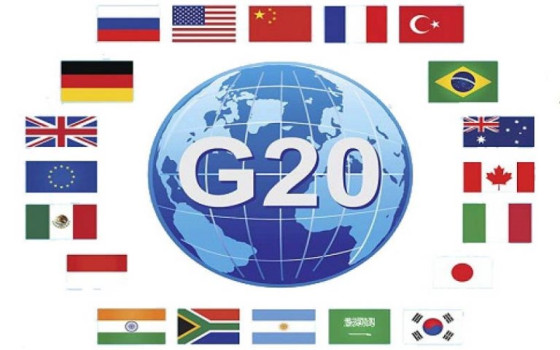
G20 Summit: UN Urges Leaders to Use Influence to End Conflicts, Especially in Gaza and Sudan, Ensure Shared Economic Growth, and Address Climate Action

- Europe and Arabs
- Saturday , 22 November 2025 8:26 AM GMT
Johannesburg, New York: Europe and the Arabs
The UN Secretary-General said the world is facing "difficult times" marked by immense suffering due to conflicts, climate chaos, economic uncertainty, rising debt, and the collapse of global aid. He added that his message to the G20 leaders meeting in Johannesburg is: "Now is the time for leadership and vision."
This came during a press conference held by Secretary-General António Guterres in the South African city ahead of the meetings, which will continue on Saturday and Sunday, according to the UN Daily News.
He said that the G20 countries, as the world's largest economies, are capable of significantly influencing the alleviation of suffering, ensuring that economic growth is widely shared, and "putting our world on a better and more peaceful path for the future." He added that he will call on the leaders during his meetings to use their influence "to lead the action we need," particularly in three key areas.
1. Working for Peace
The Secretary-General said he will call on the group's members to use their influence to end conflicts, highlighting in particular the situation in Sudan. He added that the "carnage" must end, stressing the need for:
➡️An immediate cessation of hostilities,
➡️Unimpeded delivery of humanitarian aid,
➡️A halt to the flow of weapons and fighters from external parties,
➡️The Sudanese Armed Forces and the Rapid Support Forces to sit down at the negotiating table.
Guterres also emphasized the need to end ceasefire violations in Gaza and establish a credible path to ending the occupation and achieving the Palestinian people's right to self-determination.
He further noted the need for peace in the Democratic Republic of Congo and the Sahel region—particularly Mali—as well as in Ukraine, stating: "Everywhere—from Haiti to Yemen to Myanmar and beyond—we must choose peace based on international law."
2. Economic Action
The Secretary-General pointed out that developing countries—particularly in Africa—are suffering from a "critical crisis of shrinking fiscal space, crushing debt burdens, and a global financial architecture that is unable to adequately support—or even represent—them." He said Africa must have a fair seat on all decision-making boards—from the boards of international financial institutions to permanent seats on the UN Security Council, to other global bodies.
He added that he would urge G20 members to fulfill the commitments made at the Financing for Development conference in Seville in June to provide more financing for developing countries.
This includes tripling the lending capacity of multilateral development banks, strengthening their role in attracting more private finance, easing debt burdens, and helping developing countries mobilize domestic resources, “building bridges, not trade barriers.”
“Inequality has become a cancer in our societies, concentrating power and undermining trust in democracy,” he said.
3. Climate Action
Guterres said the 30th UN Climate Change Conference in Brazil (COP30) demonstrates the scale of the work that needs to be done. He stated that avoiding further climate chaos means urgently closing the adaptation gap, which requires a massive increase in financing. He stressed the need for developed countries to deliver on their pledges in this regard. He also stressed the need to "promote a just transition to renewable energy," adding that Africa must be at the heart of the ongoing clean energy revolution.
He noted that the continent has enormous potential in solar and wind power, but lacks the necessary investment to harness it.
"No one should be left in the dark in the era of clean energy—especially the continent that has contributed the least to the climate crisis," he said. "The economics are on our side. But the political will needs to catch up."












No Comments Found